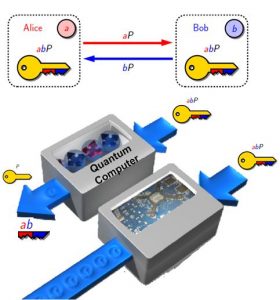 The prospect of quantum computers is a threat against the security of currently used public key cryptographic algorithms. It has been widely accepted that, both public key cryptosystems including RSA and ECC will be broken by quantum computers employing certain algorithms. Although large-scale quantum computers do not yet exist, but the goal is to develop quantum-resistant cryptosystems in anticipation of quantum computers as most of the public key cryptography that is used on the Internet today is based on algorithms that are vulnerable to quantum attacks.
The prospect of quantum computers is a threat against the security of currently used public key cryptographic algorithms. It has been widely accepted that, both public key cryptosystems including RSA and ECC will be broken by quantum computers employing certain algorithms. Although large-scale quantum computers do not yet exist, but the goal is to develop quantum-resistant cryptosystems in anticipation of quantum computers as most of the public key cryptography that is used on the Internet today is based on algorithms that are vulnerable to quantum attacks.
This project will explore isogenies on elliptic curves as a foundation for quantum-resistant cryptography. Isogeny computation is known to be difficult. This project will analyze newer and faster families of isogenies, which yield a faster solution to the problem of finding isogenies. It will exploit state-of-the-art techniques and employ new optimizations to speed up the computation in isogeny-based cryptography, including tower field and curve arithmetic. The performance of field arithmetic computation is strongly influenced by the processor micro-architecture features, the size of the operands, the algorithms, and programming techniques associated to them. This research will provide preliminary results on developing fast algorithms and architectures for post-quantum cryptographic computations suitable for emerging embedded systems.
For more information click HERE.
- R. Azarderakhsh, D. Jao, K. Kalach, B. Koziel and Ch. Leonardi, “Key compression for isogeny-based cryptosystems”, in Proc. AsiaPKC 2016, pp. 1-10, ACM, Jun. 2016.
- B. Koziel, R. Azarderakhsh, A. Jalali, D. Jao, and M. Mozaffari Kermani, “NEON-SIDH: Efficient implementation of supersingular isogeny Diffie-Hellman key exchange protocol on ARM”, in Proc. Conf. Cryptology and Network Security, CANS 2016, to appear in 2016.
- B. Koziel, R. Azarderakhsh, D. Jao and M. Mozaffari Kermani, “On Fast Calculation of Addition Chains for Isogeny-Based Cryptography”, in Proc. Inscrypt 2016, pp.334-347, 2016.
- R. Azarderakhsh and K. Karabina, “Efficient Algorithms and Architectures for the Computation of Double Point Multiplication on Elliptic Curves”, in Proc. Third ACM workshop on Cryptography and Security in Computing Systems, CS2@HiPEAC 2016, ACM, pp.25-30, Jan. 2016.